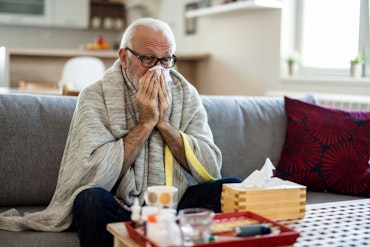Men hospitalised at highest rates due to dementia, how can this be fixed?
Men are more likely to be hospitalised due to dementia than women, with men aged 85 – 94 having the highest rates of hospitalisation, according to the Australian Institute of Health and Welfare (AIHW).
![<p>Men over 60 are admitted into hospital due to dementia at higher rates than women of the same age. [Source: iStock]</p>](https://agedcareguide-assets.imgix.net/news/articles/20_9_22_dementia_men.jpg?fm=pjpg&format=auto&w=550&q=65)
Men over 60 are admitted into hospital due to dementia at higher rates than women of the same age. [Source: iStock]
Data released through the Dementia in Australia report shows that 13,100 men and 12,400 women were hospitalised due to dementia in 2020-21.
So why do men with dementia have high hospitalisation rates and how can this issue be solved?
Why the higher hospitalisation rates?
Overall, men were hospitalised due to dementia at an above-average rate in every age demographic, while women were below-average at all stages.
Those figures show a larger disparity when age-standardised to reflect Australia’s population aged 60 and older. Fifty-one men per every 10,000 were admitted due to dementia while the age-standardised rate for women was 37.
The highest rates for both sexes was in men and women aged 90 – 94, with 253 hospitalisations per 10,000 men and 187 hospitalisations per 10,000 women. Significant numbers were also reported in men aged 85 – 89 at 203 per 10,000 men.
Doctor Kaele Stokes, Dementia Australia’s Executive Director, Advocacy and Research, says there are often multiple factors contributing to hospital admissions for men with dementia.
“Women are typically in the caring role for husbands or fathers if that family member has developed dementia,” explains Dr Stokes.
“If the male has a fall or hurts themself, the female partner is often less able to help them in that environment and may have to call emergency services. That means they end up in hospital.
“Some key lifestyle factors and comorbidity health conditions, such as diabetes or heart disease, can also be higher in men at a certain age and may add to their need to seek hospital intervention.”
Living alone can also lead to hospital admission as older men attempt to manage their dementia diagnosis without assistance.
“They may have been in a relationship where the other person has passed away and they are more likely to be socially isolated, not have a huge support network, or not reach out for support,” says Dr Stokes.
“So if they’re diagnosed with dementia they may not be as willing to disclose their diagnosis and they try to manage it at home until there’s an adverse health incident that means they end up in hospital.”
More in-home support a solution
One potential solution to reducing those numbers is providing additional in home support for people with dementia.
It is possible to live an independent lifestyle with dementia. In Australia, roughly 70% of people living with dementia still live in their own home.
“It’s really important that all parts of the aged care system, including home care, is able to support people with dementia,” says Dr Stokes.
“At the moment it’s very difficult to identify the number of people accessing home care packages that have dementia. That data set is inconsistent, but we do know that a lot of people with dementia do live in the community, including those living alone.
“They are doing everything they can to use technologies, friends, family and carers to maintain independence.”
With the right supports, people with dementia can remain living at home, where they are more comfortable, rather than moving into residential aged care.
Additional dementia care training
Dr Stokes believes that additional training for nurses and care providers will better support an independent lifestyle for all people with dementia.
“We know that dementia training or dementia education is not a mandatory part of all disciplines that work within aged care,” adds Dr Stokes.
“That means that staff don’t necessarily have the ability to understand what dementia is, how it might impact a person or how to communicate effectively – all the things that make a difference in interacting with someone [who lives with dementia].
“Steps have been taken over the last few years to better recognise dementia as a condition that needs more specialised support in healthcare, disability and aged care, but there’s still a lot to do, particularly with workforce capacity.”
She says that the rising number of Australians with dementia, a projected 1.1 million by 2058, requires an aged care system that can accommodate dementia care and support needs.
What have your experiences with your own dementia care been like? Tell us in the comments below.











![The new Aged Care Act exposure draft is slated for release in December of 2023, but advocates hope to see it rolled out on January 1, 2024. [Source: Shutterstock]](https://agedcareguide-assets.imgix.net/news/articles/wp/agedcareact__0811.jpg?fm=pjpg&w=520&format=auto&q=65)












Comments